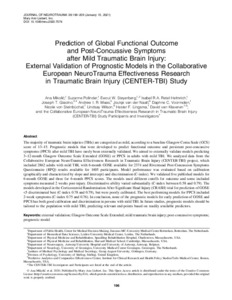Prediction of Global Functional Outcome and Post-Concussive Symptoms after Mild Traumatic Brain Injury: External Validation of Prognostic Models in the Collaborative European NeuroTrauma Effectiveness Research in Traumatic Brain Injury (CENTER-TBI) Study
Lingsma HF; van der Naalt J; Voormolen DC; Wilson L; Steyerberg EW; Maas AIR; Giacino JT; Mikolić A; Retel Helmrich IRA; van Klaveren D; the CENTER-TBI Participants and Investigators; Polinder S; von Steinbüchel N
https://urn.fi/URN:NBN:fi-fe2021050328509
Tiivistelmä
The majority of traumatic brain injuries (TBIs) are categorized as mild, according to a baseline Glasgow Coma Scale (GCS) score of 13-15. Prognostic models that were developed to predict functional outcome and persistent post-concussive symptoms (PPCS) after mild TBI have rarely been externally validated. We aimed to externally validate models predicting 3-12-month Glasgow Outcome Scale Extended (GOSE) or PPCS in adults with mild TBI. We analyzed data from the Collaborative European NeuroTrauma Effectiveness Research in Traumatic Brain Injury (CENTER-TBI) project, which included 2862 adults with mild TBI, with 6-month GOSE available for 2374 and Rivermead Post-Concussion Symptoms Questionnaire (RPQ) results available for 1605 participants. Model performance was evaluated based on calibration (graphically and characterized by slope and intercept) and discrimination (C-index). We validated five published models for 6-month GOSE and three for 6-month PPCS scores. The models used different cutoffs for outcome and some included symptoms measured 2 weeks post-injury. Discriminative ability varied substantially (C-index between 0.58 and 0.79). The models developed in the Corticosteroid Randomisation After Significant Head Injury (CRASH) trial for prediction of GOSE <5 discriminated best (C-index 0.78 and 0.79), but were poorly calibrated. The best performing models for PPCS included 2-week symptoms (C-index 0.75 and 0.76). In conclusion, none of the prognostic models for early prediction of GOSE and PPCS has both good calibration and discrimination in persons with mild TBI. In future studies, prognostic models should be tailored to the population with mild TBI, predicting relevant end-points based on readily available predictors.
Kokoelmat
- Rinnakkaistallenteet [19250]
